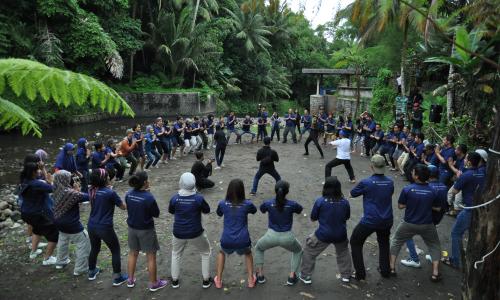
Refleksi Perjalanan di WRI
By Nanda Noor, Forests and Land Use Research Analyst.
Seven months in. Time to reflect.
In my whole life, I have never experienced a more challenging evaluative process than this moment. It has been a wonderful yet intriguing journey at an environmental think-tank in my own country. What a “lucky-seven” months it has been, as I have been surrounded by smart and fun office-friends.
And this writing is dedicated to all of them.
I started everything a bit slow – warming up was needed as I had “left the real-world” for almost 2 years, although I also believe in maintaining momentum above haste. After all, life is a marathon and not a sprint, right? Indeed, we have lots on our plate, but the most fun part in working at WRI is that – no matter how busy or loosened our work is, there’s always “something we could do” – a chain reaction of interesting tasks and endless exploration. Through WRI, I have been consistently reminded that can-do attitude is perhaps the most important workforce skill, with ideas at the very core. WRI’s environment of empowerment is not perfect, but good enough to trigger the driving force for innovation, be it small or ambitious ones. But what exactly do I innovate on?
Participatory mapping. Photo by Julius Lawalata/WRI
To answer this, I would need to invite you as readers to rewind our lives into childhood. Most of us probably had fun playing with physical globes and maps, being proud about how much we know about the world and connect places with people. If we are not on the map, we simply do not exist. Fast-forward to the current time, these rings true also to competition in map claims, where different entities are entitled to the same areas on the map due to outdated and inaccurate geospatial data. Does this mean that such land and its people exist for more than one “owner”? The answer is: it should not be. That is why the Government of Indonesia, using the One Map Policy framework, is making urgent efforts in syncing digital map information with licenses, so the existing duplication could be solved and future discrepancies could be prevented. What it is trying to build is beyond status and into continuous transformation for many stakeholders.
To borrow the words from my country director, “we are here to serve the country” –is exactly what WRI is doing as a development partner. In practice, this is the reason we are assisting the Geospatial Information Agency/Badan Informasi Geospasial (BIG) among others, in our common quest to further enable both technological and institutional capacities of local governments, for better land use planning and development trajectories. And this is just one piece of the whole pie we are baking.
Even with One Map realized, for someone with the least geospatial expertise, it was not until months of deep-diving at WRI until I realized that maps could still very well be a “dumbed” version of our true knowledge. As One Map utilizes cyber systems such as online geoportals, we must note that relying mostly on technological solutions will not get us far. There is a worth in “hearts beyond machines”, meaning that a constant “feel of struggle” to deliver added values to the game is making us work almost tirelessly. Let us face it - the development and business model for geospatial information-based industry are expanding – now the humbling million-dollar question arises: is my country ready? For me, reconnecting with childhood brings me back to 20 years ago, yet we do not have 20 years ahead to bring the vision of One Map into reality. The case in Indonesia cannot wait until 2040 to finish and turn into benefits. Indeed, in WRI, time is often a luxury we do not have.
As someone who is trying to follow the global agenda of 4th Industrial Revolution, I can say that some things are meant to change faster than we thought – like artificial intelligence and robotics. Yet some other things will change very slowly, and even face risk of only shifting slightly or remain unchanged at all. The later scenario includes what is possible in Indonesia case at the moment. Although as I type these words from my peaceful desk at home during the Ramadhan month, in which >85% of Indonesian population are celebrating, I keep on telling myself that Ramadhan’s value of patience and humility, are stronger than any of our challenges combined. Thus, in hindsight I would not change a thing in my early days at WRI, even if I could rewind time.
Today – as we celebrate the World Environment Day – along with the recent commemoration of World Information Society Day on 17th of May, I believe there is no better momentum to say that our work has never been more important. The journey is much more enjoyable and exciting, when we work while reflecting on the move forward.